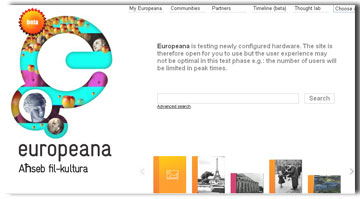With somewhat less fanfare than its original launch, when thousands of budding Europeans scrambled online to enter the search time “Mona Lisa”, the European cultural heritage portal Europeana has gone online.

The portal and design seems quite impressive, and technically, there appear to be few glitches. However, the level of metadata is quite disappointing – type in Mozart or Freud and, while you get some interesting photographs or musical scores, their lineage is not immediately apparent. There are only four or five metadata fields, and nothing on the genesis of the items digitised, i.e. who took the photo of Freud.
However, this is only after a very quick play. Other items may have more extensive information. Time will tell whether this is something the general public will want to use.
Colleagues at UKOLN have been writing some interesting critiques of Europeana. Paul Walk points to a lack of clear sightedness in creating the Europeana technical infrastrutcure while Brian Kelly has looked at the German use of Wikipedia as a host for cultural heritage.
